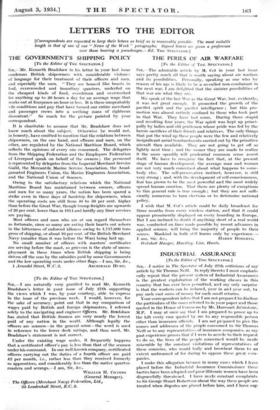LETTERS TO THE EDITOR
[Correspondents are requested to keep their letters as brief as is reasonably possible. The most suitable • length is that of one of our "News of the Week" paragraphs.- Signed letters are given a preference over those bearing a pseudonym.—Ed. THE SPECTATOR.] •
THE GOVERNMENT'S SHIPPING POLICY
[To the Editor of THE SPECTATOR.]
Stn,—Mr. Kenneth Bradshaw in his letter in your last issue condemns British shipowners with considerable violence of language for their treatment of their officers and men, and especially the men. They arc housed like beasts in foul, overcrowded and insanitary quarters, underfed on the cheapest kinds of food, overdriven and " overworked for anything up to 20 hours a day for an average wage that works out at fourpence an hour or less. It is these unspeakably vile conditions and pay that have turned our entire merchant and passenger crews into a seething mass of righteous discontent." So much for the picture painted by your correspondent.
It is charitable to assume that Mr. Bradshaw does not know much about the subject. Otherwise he would not, in honesty, have omitted-to mention that the relations between shipowners, on the one hand, -and officers and men, on the other, are regulated by the National Maritime Board, which reflects the opinions of every one concerned. The delegates from the Shipping Federation and the Employers Federation of Liverpool speak on behalf of the owners ; the personnel is represented by delegates from the Imperial Merchant Service Guild, the Mercantile Marine Service Association, the Amal- gamated Engineers Union, the Marine Engineers Association, and the National Union of Seamen.
Owing to the satisfactory relations which the National Maritime Board has maintained between owners, officers and men for so many years, the nation has been spared a strike even in these days of hardship for shipowners, when the operating costs are still from 40 to 50 per cent. higher than before the Great War, though tramp freights are upwards of 20 per cent. lower than in 1914 and hardly any liner services are paying.
Most officers and men who are at sea regard themselves as fortunate, since so many are eating their hearts out ashore in the bitterness of enforced idleness owing to 1,717,600 tons gross of shipping, or about 10 per cent. of the British Merchant Navy (smaller than it was before the War) being laid up.
No - small number of officers with masters' certificates are serving before the mast, so grievous is the state of unem- ployment in these times when British shipping is being driven off the seas by the subsidies paid by some Governments and the low operating costs under other flags.—I am, Sir, &c.,






























 Previous page
Previous page